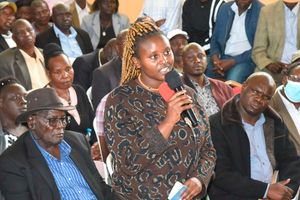
Many gullible parents have been duped by dubious agencies that claim to secure scholarships for Kenyan students.
The whereabouts of thousands of Kenyan students who went abroad to study but later dropped out for various reasons is unknown, the Commission for University Education (CUE) has revealed.
The commission told a parliamentary committee yesterday that it could only give the number of students by gender who had gone to foreign universities, but not what exactly they were doing in those countries.
Following the revelation, lawmakers in the National Assembly expressed concern that the situation could lead to some students being deported or stranded in their host countries.
Appearing before the Committee on Diaspora Affairs and Migrant Workers, the Commission's Standards and Quality Assurance Division, Dr Eunice Marete, and the Commission's Senior Assistant Secretary (Standards, Recognition and Equivalence of Qualifications), Gilbert Opanga, told MPs that data protection in those countries prevented them from knowing exactly what the students were doing.
"We can give the number of students who have gone abroad by gender, we have the data and we are constantly updating it. We can also get the numbers that have gone from the agencies but we cannot get what they are doing because of data protection in those countries," Mr Opanga told MPs.
Mr Opanga told MPs that there was need to work with other stakeholders to know what students do after they drop out of their courses.
"We need to tighten the rules so that when they drop out, we know if they have enrolled for another course," Mr Opanga said.
He said they would compile data on the numbers by June and present it to the committee.
Mr Opanga told MPs that Australia and Ireland have become the favourites of most Kenyans seeking education in foreign universities.
Dr Marete said only licensed recruitment agencies are allowed to facilitate the enrolment of students in foreign universities.
Thousands of gullible parents and guardians have been duped of millions of shillings by dubious agencies that claim to be able to place them in some of the prestigious universities abroad.
Parents usually fork out millions of shillings to these fraudsters in the hope that their children will fulfil their academic dreams in the foreign universities. However, in most cases this has turned out to be a scam, leaving many parents defrauded but with no recourse as the agencies operate illegally.
When licensing recruitment agencies, the Commission requires them to submit the number of students recruited to each university and country. The data must be broken down by gender.
Agencies are also required to provide the name and level of the programme the students would be studying at the foreign institutions, the type of sponsorship, whether the students are self-sponsored or on scholarship.
If the students are on scholarships, the agencies are expected to provide the name of the organisation.
In order to be licensed by the commission, the agencies must meet other legal requirements set by the national government, such as having a certificate of incorporation, a business licence and a freight certificate.
However, Dr Marete complained that some agencies start operating as soon as they obtain these documents without a licence from the commission.
To curb this, Dr Marete said the commission is currently working with the National Intelligence Service (NIS), Directorate of Criminal Investigations (DCI) and county governments to ensure compliance by student recruitment agencies.
Dr Marete also lamented that with the advancement of internet connectivity, some agencies are opting to operate online, making it difficult for the commission to detect them and bring them under the applicable regulatory framework.
"The commission is keen to act on any negative information about agencies that comes from the mainstream media as well as social media," Dr Marete told the committee.
The committee is conducting investigations into the legality of recruitment by agencies in the country.
Kenya is currently grappling with the Finland scholarship row, where some families claimed they were duped of millions to recruit their children to study abroad.











